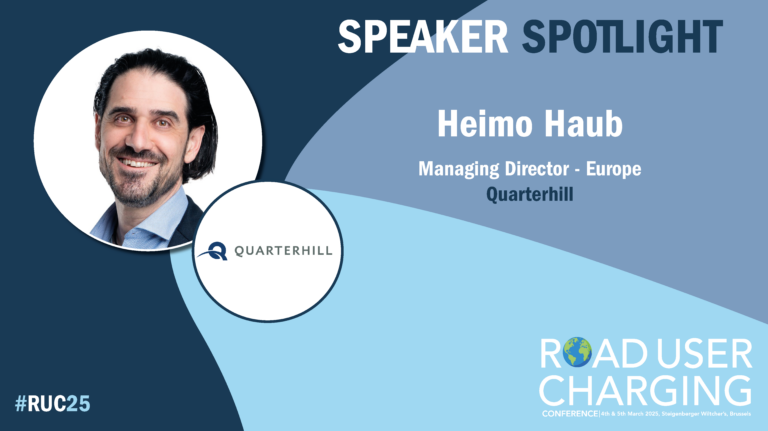As Road User Charging Conference 2025 approaches, CiTTi Magazine profiles the experts set to speak at the world-renowned event next year.
Taking place on 4-5 March 2025 at the Steigenberger Wiltcher’s in Brussels, Belgium, the 22nd annual Road User Charging Conference will discuss the latest developments in user-financed transportation.
The prestigious two-day gathering attracts industry leaders, policymakers and innovators from across the world and serves as an essential forum for active discussion, knowledge exchange and peer-to-peer learning on best practices for planning, financing, implementing, operating and maintaining tolling, road usage charging and mobility pricing schemes on motorways, highways and in urban environments.
One of the experts confirmed to speak at the event is Heimo Haub, managing director of Quarterhill in Europe, one of the word’s leading firms designing, developing and deploying technology systems for the intelligent transportation systems (ITS) industry.
With more than 19 years of experience in the ITS and tolling industries, Haub is skilled in business development, go-to-market strategy, product marketing, electronic toll collection, commercial vehicle operations and organisational development.
At the conference, Haub will discuss practical experiences in brownfield multi-lane free-flow (MLFF) toll migration, offering insights into the challenges and opportunities associated with converting existing toll operations to MLFF systems.
He will share lessons learned from prior implementations, highlighting best practices and key considerations for ensuring a smooth transition, as well as provide valuable guidance for industry stakeholders navigating the complexities of system upgrades while maximising operational efficiency and minimising disruption.
 Name: Heimo Haub
Name: Heimo Haub
Job Role: Managing Director – Europe
Orgnaisation: Quarterhill
What is the best aspect of your job?
As managing director of Quarterhill in Europe, my primary role is to establish and expand our European operations. This is particularly exciting given the integration of local ITS companies with their suppliers and regional and global networks. A key focus of my role is creating synergies and introducing our safety and enforcement solutions to Europe. We are already delivering new safety projects in the Netherlands and Belgium, and we are now bringing our extensive tolling expertise back to Europe – a homecoming for me, having spent more than 15 years in this industry.
What is the biggest challenge facing those with responsibility for user-financed transportation in 2025?
One of the biggest challenges will be ensuring a smooth transition from current technologies to more advanced systems. The challenge isn’t the technology itself, which is well-established, but the strategy for migrating from old systems to new ones with minimal disruption. Quarterhill has extensive experience in managing these transitions, and we are well-positioned to support clients through this process.
What’s your best piece of advice for those looking to implement user-financed transportation solutions?
Don’t focus solely on the technology – understand the underlying business processes required to get the most from the new systems. Develop a robust, risk-managed strategy for transitioning from existing systems to new ones while preserving the revenue stream. Work with technology providers that have a proven track record in delivering seamless transitions and mitigating risk.
FREE: Subscribe to the monthly Road User Charging Conference Newsletter!
Does legislation help or hinder development in the sector?
Legislation plays a crucial role in shaping the sector by defining objectives and standards. However, for legislation to be effective, it must evolve in step with technological innovation. If not aligned properly, legislation risks stifling innovation. In tolling, especially for light vehicles, there is a pressing need for updated regulations around privacy and cross-border interoperability within the EU. Addressing these areas will support further development in the sector.
How will the business of user-financed transportation have changed by 2030?
By 2030, a larger share of European toll roads will operate as multi-lane free-flow systems, delivering a seamless, customer-centric experience. Electronic toll collection will be enhanced by in-vehicle information services, offering drivers richer, more dynamic services across Europe. The decline in revenue from fuel taxes, driven by the rise of electric vehicles and more fuel-efficient engines, will require innovative funding solutions for passenger vehicles. Additionally, several tolling concessions are nearing the end of their contracts, prompting governments to explore new approaches. Cities will also need to modernise their traffic flow management.
Why are you looking forward to speaking at Road User Charging Conference 2025?
I value knowledge sharing and exchanging ideas with industry peers. We have a wealth of practical experience and lessons learned from our North American business, and I look forward to bringing those insights to Europe. The conference offers an invaluable opportunity for direct conversations with European toll practitioners, allowing me to better understand their needs, challenges and goals.
You can learn more about the key trends and challenges affecting senior decision-makers who have responsibility for user-financed transportation – including tolling, pricing and road-usage charging – across the world at Akabo Media’s global series of Road User Charging Conferences in Brussels (March 2025), Abu Dhabi (May 2025) Miami (September 2025) and Singapore (October 2025). Click here for more information!





